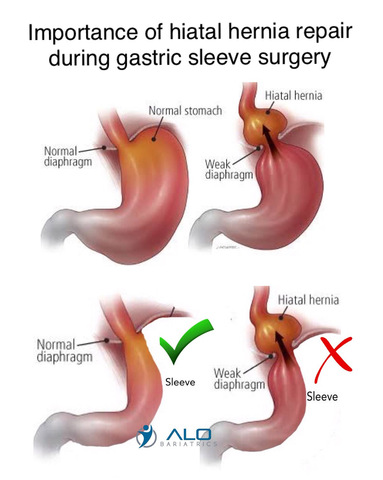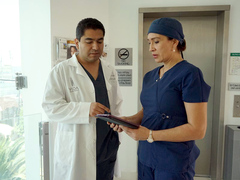Dr. Alejandro Lopez, founder of ALO Bariatrics makes commitment to repair all Hiatal Hernias encountered while performing any Bariatric Surgery
October 07, 2016 (PRLEAP.COM) Health News
October 7, 2016 - Upholding its commitment to their patients' health, ALO Bariatrics has made a vow to always repair hiatal hernias whenever encountered during a Bariatric Procedure. Some surgeons prefer not to repair hiatal hernias when encountered during surgical procedures. Hiatal hernia reparation is an additional procedure, it does require additional time in the operating room and additional specific skills from the surgeon.What is Hiatal Hernia? - In order to fully understand what a hiatal hernia is, a bit of anatomy is in order. The diaphragm is the muscular wall separating the chest cavity from the abdominal cavity. The hiatus is located in the diaphragm, is the opening where the connection of the esophagus and the stomach attaches.
The lower esophageal sphincter (LES), keeps stomach contents from backing up into the esophagus (reflux).The hiatus normally has to be tight and small. If it is more open than it should be, a hiatal hernia is developed, the stomach moves up through the chest cavity.
This pushes the LES up, away from the hiatus and it loses the support that it needs from the diaphragm to stay closed. This raises the risk for symptoms of heartburn and gastro-esophageal reflux disease.
Bariatric Surgery and Hiatal Hernia Repair - Hiatal hernia surgery can be performed as a laparoscopic, or "minimally invasive," procedure.
Some surgeons prefer not to repair hiatal hernias when encountered during surgical procedures.
Hiatal hernia reparation is an additional procedure, it does require additional time in the operating room and additional specific skills. Upholding its commitment to their patients' health, ALO Bariatrics has made the commitment to always repair hiatal hernias whenever encountered during a Bariatric Procedure.
Dr. Alejandro López's experience has revealed that if a hiatal hernia is left unrepaired in a patient that is going through bariatric surgery, there's a high risk to develop harsh symptoms post-surgery such as vomit or severe acid reflux, therefore; as a policy, ALO Bariatrics opts to repair hiatal hernias when encountered for the wellbeing of our patients.
That way, ALO Bariatrics, makes sure their patients do not experience severe and unwanted symptoms after surgery.
In the Operating Room, ALO Bariatrics' patients can have both surgical procedures performed at once: Bariatric surgery and Hiatal hernia repair.
Often patients that had their procedures performed somewhere else and did not have their hernia repaired need to withstand another surgical procedure few months after their bariatric surgery in order to repair said hernia on account of complications and discomforts derived.
For example, after gastric sleeve surgery; the pressure in the new stomach is bigger when food goes through because it is smaller. If there is a hiatal hernia, this pressure will easily cause vomit or reflux.
Also, the diameter of the gastric sleeve is almost the same as the esophagus, so it can easily move up to the chest cavity and increase the symptoms of reflux.
Hundreds of ALO Bariatrics' Revision Surgery patients that had a previous bariatric procedure performed at another facility; often, do not experience the expected weight loss and develop symptoms of severe reflux as consequence of an unrepaired hiatal hernia. In such cases Dr. Alejandro Lopez repairs the hiatal hernia; frequently it is required to convert the primary failed procedure into another; for example: a vertical sleeve gastrectomy to a gastric bypass surgery.
Causes of Hiatal Hernia - Sometimes the cause is unknown. A person can be born with a larger hiatal opening. Also it can be caused by increased pressure in the abdomen such as from obesity, pregnancy, etc.
Who has more risk to develop Hiatal Hernia?
Hiatal hernias occur often in women, people who are overweight, and people older than 50.
Symptoms
Most people who have hiatal hernias don't realize it because they don't feel any symptomatology.
Those who have Symptoms can include: heartburn, regurgitation, difficulty swallowing, chest pain, a bloated feeling after eating, Shortness of breath.
Dr. Alejandro López emphasizes the importance of hiatal hernia repair when encountered during a bariatric procedure. He also cites some articles that mention the importance of hiatal hernia repair, such as BariatricNews.net's "Hiatal Hernias must be closed in most sleeve gastrectomies" and PubMed.gov's "Sleeve gastrectomy and crural repair in obese patients with gastroesophageal reflux disease and/or hiatal hernia"


